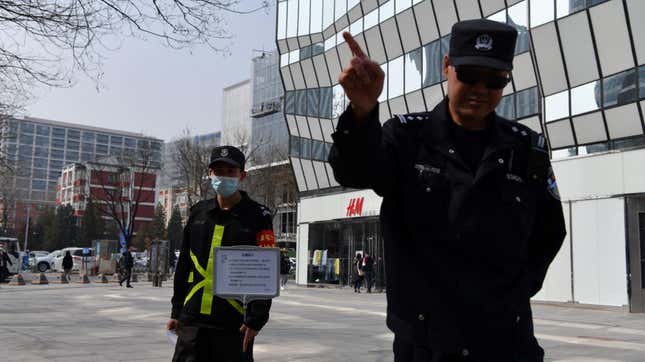
H&M has been purged from maps and internet listings in China after the clothing retailer criticized the use of forced labor in Xinjiang province, the area in northwestern China where Uighurs, a predominantly Muslim ethnic group, have been systematically oppressed by the Chinese government.
Baidu Maps no longer lists H&M locations in China and Alibaba’s Tmall, an enormous e-commerce site in China, no longer lists products from H&M, according to a new report from Reuters. JD.com has also pulled all H&M products, according to China Daily.
The de-listings followed an opinion piece in Chinese state media’s The People’s Daily newspaper on Wednesday in support of cotton produced in Xinjiang. Strangely enough, H&M’s criticisms of forced labor in Xinjiang were actually published in 2020 and it’s not clear why Chinese state media outlets have chosen to take on H&M in 2021.
“We welcome all foreign enterprises to invest in China but the bottom line cannot be touched and respect is a prerequisite for conducting business,” the People’s Daily opinion piece from Wednesday reads. “China’s determination to safeguard the development, stability and unity in Xinjiang is unwavering.”
H&M currently has 505 stores in China, the second largest locations of any country for the retailer, according to the company’s website. H&M has 582 stores in the U.S., the largest number in the world.
H&M’s 2020 statement criticizing forced labor in Xinjiang is so old that it’s no longer online, but a copy has been saved by Google’s cache:
H&M Group is deeply concerned by reports from civil society organisations and media that include accusations of forced labour and discrimination of ethnoreligious minorities in Xinjiang Uyghur Autonomous Region (XUAR).
We strictly prohibit any type of forced labour in our supply chain, regardless of the country or region. If we discover and verify a case of forced labour at a supplier we work with, we will take immediate action and, as an ultimate consequence, look to terminate the business relationship. All our direct suppliers sign our Sustainability Commitment that clearly states our expectations with regards to forced labour and discrimination linked to religion or ethnicity, for their own operations as well as their supply chains.
The statement continued by explaining that it did not source cotton from the Xinjiang region and that a report by the Australian Strategic Policy Institute has its facts wrong about a potential supplier that was supposedly sourcing cotton from Xinjiang for H&M.

The Chinese government’s brutal treatment of the Uighur people has been under increased scrutiny since 2017 when mainstream Western media outlets started reporting on the extreme surveillance state that had been constructed in Xinjiang.
The Chinese Communist Party has also come under fire for the concentration camps and re-education camps built for Uighurs to rid the ethnic group of their language and customs, a kind of cultural genocide built on creating a homogenous state of China. The Chinese government rejects the characterization of the concentration camps as concentration camps and defends the re-education programs as “anti-terrorism” and anti-radicalization efforts.
The People’s Daily also criticized companies like Nike on Wednesday, which also expressed concern about the treatment of Uighur people in Xinxiang last year. And while some celebrities in China have criticized Nike over the past 24 hours, according to Al Jazeera, the athletic retailer’s e-commerce presence has not yet been touched. That, of course, can change on a dime.